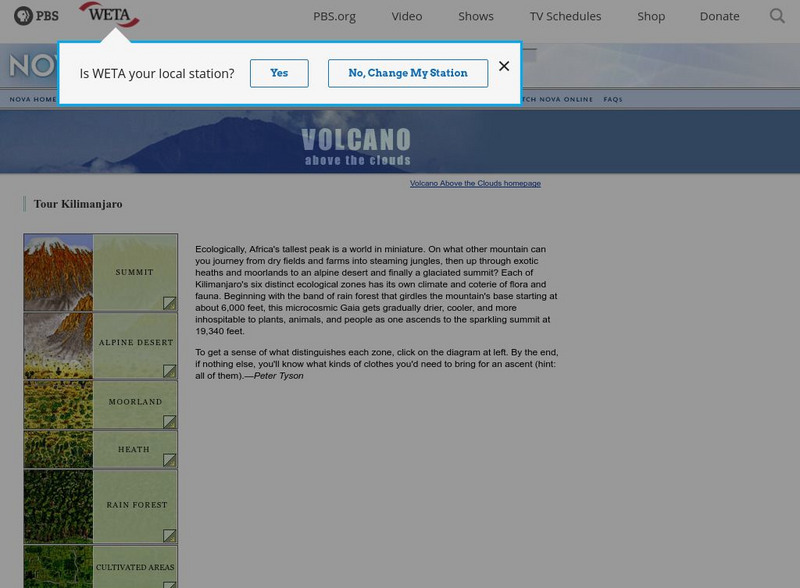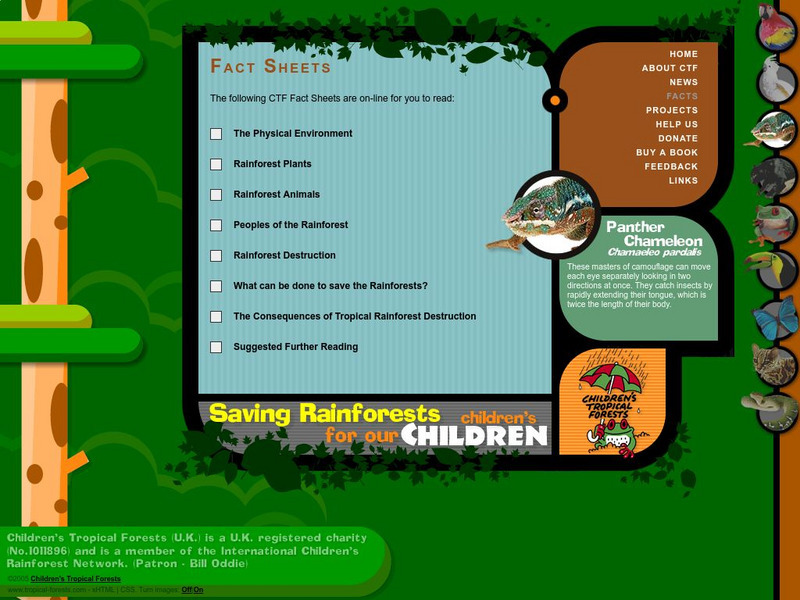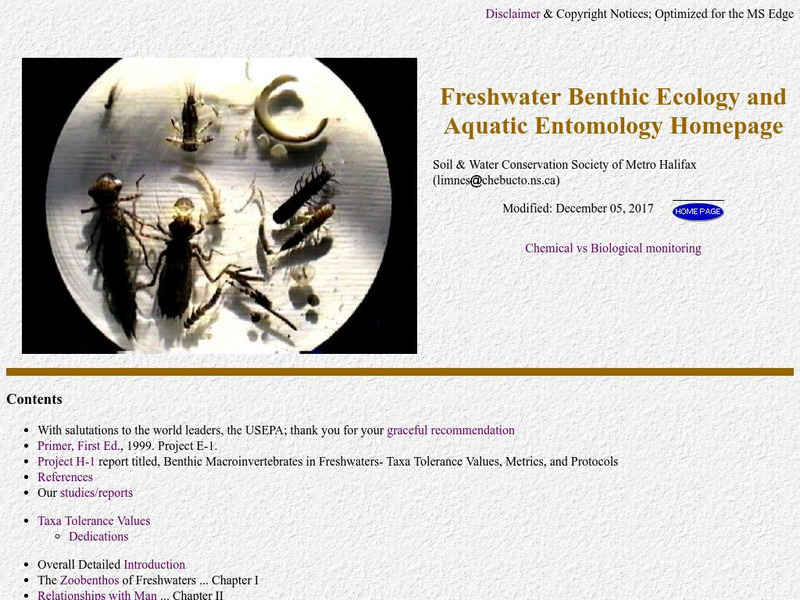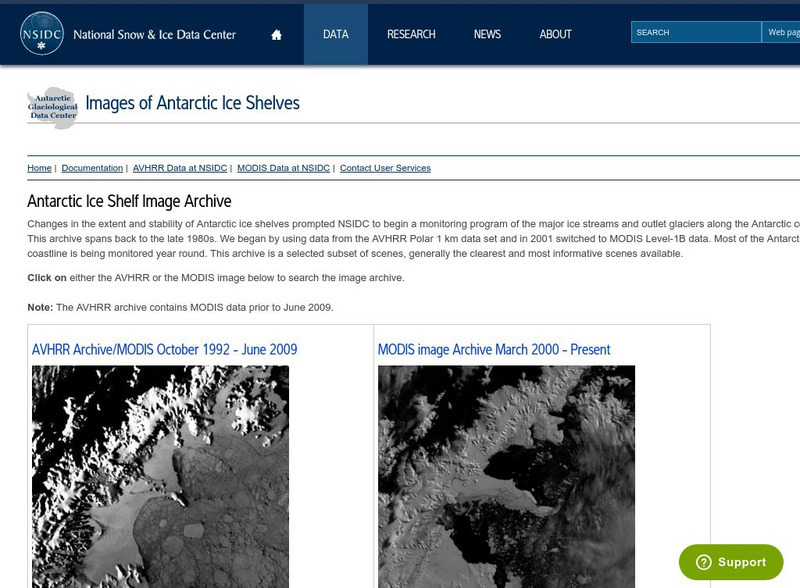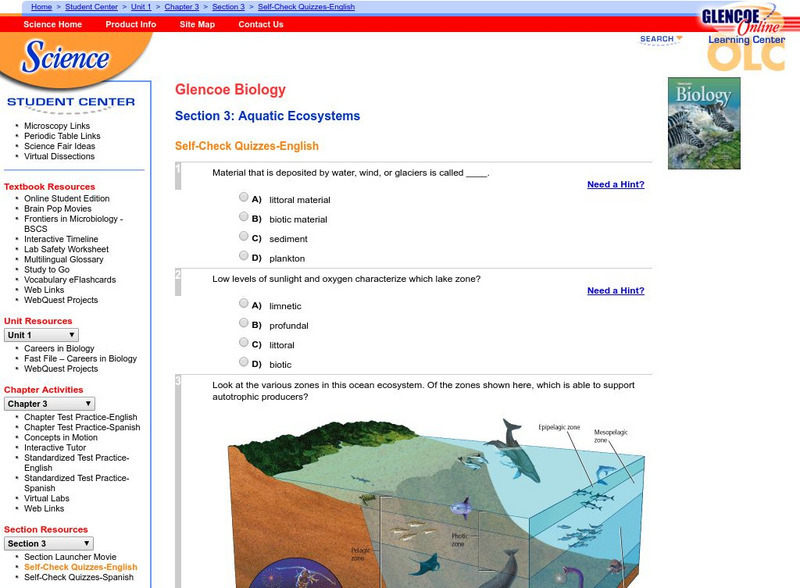PBS
Pbs Kids: Plum Landing: Invaders!
This bustling game is a race to help Plum eliminate introduced or invasive species before they crowd out the native populations.
PBS
Pbs Teachers: Predator Protector Game Lesson
Describe the habitat, food web and ecosystem of shark species. Identify threats to sharks and explore how top predators help to maintain the balance of nature within ecosystems. This lesson plan also contains an interactive game.
PBS
Nova: Tour Kilimanjaro
Experience six different ecological zones as you climb Mt. Kilimanjaro. Pictures of plants living in each of the zones are also part of this virtual tour of the mountain.
Other
Children's Tropical Forests: Rain Forest Facts
Read fact sheets about topics related to the rainforest: the physical environment, plants, animals, native people, its destruction, consequences of destruction, and ways to help.
Other
Rainforest Alliance Learning Site
The Rainforest Alliance Learning Site contains free conservation education materials with dynamic units that follow national standards for learning. On the site you will find stories, lesson plans, fact sheets, presentations, and...
Other
Rainforest Action Network
This site from the Rainforest Action Network deals with the preservation of our rainforests and what you can do to help.
Other
Athro Limited: Tundra
Graphics and descriptions of the permafrost, low area vegetation, high area vegetation, and landforms.
Other
Freshwater Ecology
This is a comprehensive and detailed site providing information on aquatic macroinvertebrates. The emphasis is on biomonitoring of water quality through quantitative assessment of numbers and types of small aquatic organisms.
Other
College of Du Page: Energy in an Ecosystem
Ecosystems contain two kinds of commodities: matter (nutrients) and energy. Nutrients cycle through the ecosystem, available for repeated use by organisms. These cycles of use and reuse are called biogeochemical cycles. Energy instead is...
Other
Cartage: Mangrove Habitats
This thorough resource lists the features that all mangrove trees have in common, the types of organisms we may find in a mangrove community, and the three most common mangrove trees.
Other
Cartage: Salt Marsh Habitats
This resource provides a thorough examination of salt marshes and the grasses, plant species, and animal species that inhabit these areas.
Other
San Francisco Bay Area Wetlands Restoration Program
Homepage for the massive wetlands restoration project in San Francisco Bay. History, objectives, and benefits of the project are described.
National Snow and Ice Data Center
National Snow and Ice Data Center: Images of Antarctic Ice Shelves
View satellite pictures of 19 different areas of the ice shelves surrounding Antarctica. Each picture is labeled and can be viewed in the thermal or visible parts of the spectrum.
US Geological Survey
Lake Pontchartrain Basin Foundation: Ecosystems in Delicate Balance
Learning activities to investigate how organisms interact in a functioning ecosystem. Students will explore the role organisms play in food chains and preserving biodiversity in ecosystems. Lake Pontchartrain Basin ecosystem is featured...
McGraw Hill
Glencoe Biology: Aquatic Ecosystems: Self Check Quiz
Try these five multiple-choice questions about aquatic ecosystems. After answers are submitted, students can review their mistakes.
Other
Ttu: Alpine Tundra
Information on the land uses, plants, wildlife, habitats and soil. There are literature citings at the bottom of the page.
Other
Caesar Kleberg Wildlife Research Institute: Native Habitat Restoration [Pdf]
This presentation explains why it is important to do restoration of a habitat. It explains what to expect, developing a plan, where to get help, assess the area, preparing the soil, choosing and planting seeds, managing the habitat as it...
Scholastic
Scholastic: Study Jams! Science: Ecosystems
A video and a short multiple-choice quiz on the topic of ecosystems, covering biotic and abiotic factors, and the roles organisms play in an ecosystem.
Exploring Nature
Exploring Nature Educational Resource: Rainforests of the World
Read about different rainforests around the planet. Find out geographical information, as well as typical plants and animals living there.
Smithsonian Institution
Smithsonian National Zoo: Zoogoer Magazine: Grasslands on a Grand Scale
Jeffrey P. Cohn's article in Zoogoer Magazine, "Grasslands on a Grand Scale," examines a variety of animals and topics associated with the grasslands. Among the animals discussed are the bison, the great horned owls, the cattle, and more.
Smithsonian Institution
Smithsonian National Zoo: Zoogoer Magazine: Teeming Life in Gabon's Rainforest
The article, "Teeming Life in Gabon's Rainforest," covers a variety of topics related to rain forest life including A Plethora of Plants, What's in the Water, New and Exciting Herps, Birds in the Mist (Nets), Magnificent Mammals, and more.
World Wildlife Fund for Nature
World Wildlife Fund: Our Earth: Ecoregions: Habitats: Grasslands
An introduction to the grasslands. Includes link to information about the types of animals that live in this habitat.
World Wildlife Fund for Nature
Wwf: Our Earth: Ecoregions: Habitats: Temperate Forests
Defines "temperate forest" and introduces three types: Mediterranean forests, temperate rainforests, and deciduous forests.
World Wildlife Fund for Nature
Wwf: Our Earth: Ecoregions: Habitats: Coniferous Forests
An introduction to coniferous forests. Includes a link to information about animals living in this habitat.
Other popular searches
- Ecosystems and Biomes
- Food Chains in Biomes
- Land Biomes
- Desert Biomes
- Aquatic Biomes
- Marine Biomes
- Water Biomes
- Earth's Biomes
- Biomes of South America
- Biomes of the World
- Biomes Powerpoint Presentation
- World Biomes




